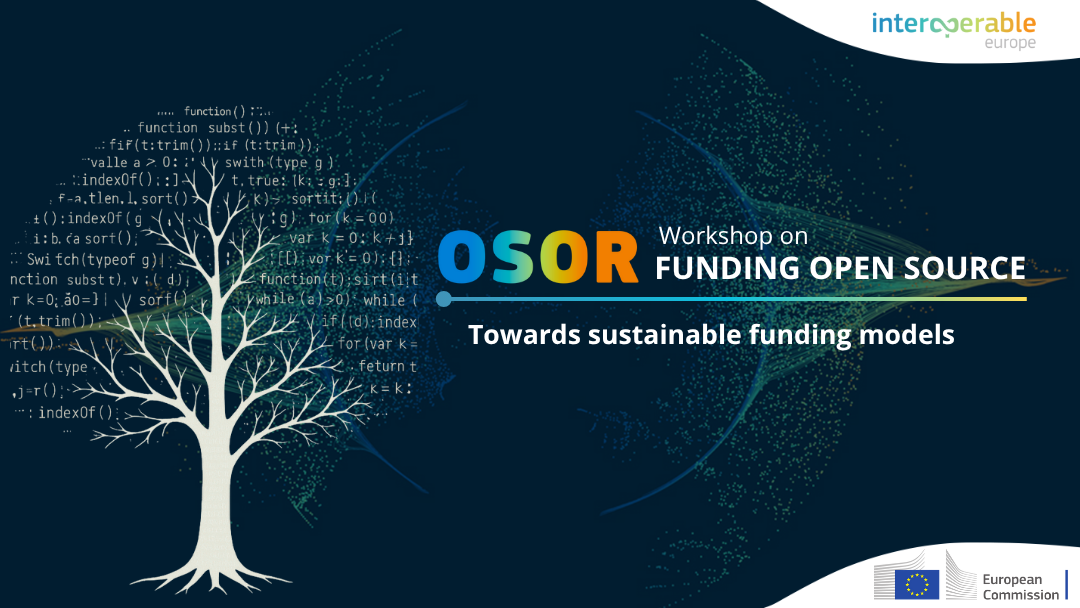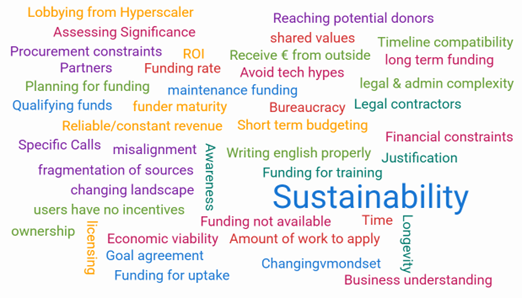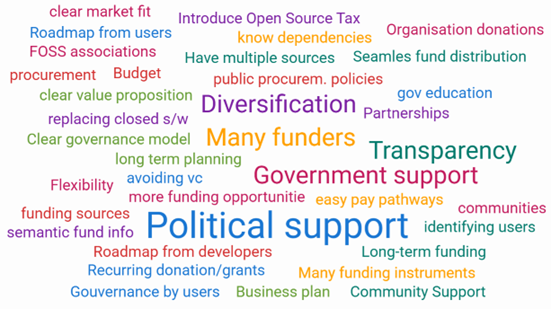
Open source is a pillar of interoperability and digital sovereignty. However, many projects are struggling to secure stable financial resources, particularly for maintenance activities, which are often invisible yet essential.
On 30 June 2025, the OSOR team held the workshop “Funding Open Source: Towards Sustainable Models” aimed at exploring different approaches to funding and fostering discussion among participants and a panel of speakers on moving towards sustainable funding models. The session featured contributions from Nil Homedes (Decidim), Joël Lambillotte (iMio), and Mirko Swillus and Paul Sharratt (Sovereign Tech Fund), who each shared their experience and insights on open source project funding.
Decidim: towards a strategic diversification
1. Speakers’ presentations: Three pathways to sustainable Open Source funding
Decidim is an open source platform for participatory democracy, originally developed by the city of Barcelona. Nil Homedes shared how the project responded to a funding crisis in 2022 by designing a sustainability plan based on four pillars:
-
Reducing reliance on public subsidies;
-
Introducing a partnership policy inviting companies that implement Decidim to contribute 3% of their related revenue back to the association;
-
Encouraging donations from the community and supporters;
-
Doing fundraising work to secure funding from foundations, NGOs such as People Powered, and EU programs like Horizon Europe.
iMio: Reaching autonomy through mutualisation
iMio, represented by Joël Lambillotte, is a Belgian public entity providing open source digital services to over 400 municipalities in Wallonia. Originally supported by public subsidies, iMio has successfully transitioned to a fully self-financing model over the past three years. Its funding strategy is based on three key pillars:
-
Usage-based contributions: Municipalities pay only for the services they use, calculated according to population size.
-
Legal autonomy: iMio operates under the in-house procurement principle, which allows municipalities to delegate services directly to iMio without public tenders. This legal framework ensures long-term collaboration and institutional trust.
-
Democratic governance: Over 300 representatives participate in the annual general assembly, ensuring transparency and shared decision-making.
Sovereign Tech Fund: Investing in digital commons
Mirko Swillus and Paul Sharratt, showcased the work of the Sovereign Tech Agency, a public body established by the German government to support and secure the digital commons. Its mission is to ensure that open source infrastructure receives sustained public investment as a matter of digital sovereignty and strategic resilience. The agency runs several programmes designed to strengthen the open source ecosystem:
-
Sovereign Tech Fund (STF): the main initiative, investing globally in the development, improvement, and maintenance of foundational open digital technologies that serve the public interest. Since its launch, STF has allocated approximately €23.5 million into over 60 critical projects, focusing on areas essential to public infrastructure.
-
Sovereign Tech Resilience: a programme focused on cybersecurity and digital autonomy, with the goal of maintaining core components of the digital stack in a secure and sovereign manner.
-
Sovereign Tech Fellowship: providing direct financial support and recognition to open source maintainers, who play a key role in sustaining vital digital tools and services.
Beyond its domestic mandate, the Sovereign Tech Agency aspires to be a model for public investment in digital infrastructure, engaging at both European and international levels.
2. Collective reflections on sustainable funding
The second half of the workshop focused on an open discussion around the evolution of funding models. Participants reflected on key questions: how models are changing, what challenges they face, and what enables long-term sustainability.
Two live word clouds captured the collective input. The first (see below) illustrated the main challenges, with terms like sustainability standing out.

The second (see below) highlighted key success factors, such as political support, diversification, and transparency.

3. Master deck and resources
- Master deck: Access all key slides and materials presented during the webinar here
- Webinar recording: Watch the full session here
- Timecodes:
- Speakers’ presentations:
- Decidim: [00:08:48 – 00:39:20]
- iMio: [00:40:01 – 01:01:55]
- Sovereign Tech Fund: [01:02:02 – 01:41:00]
- Collective reflection:
- Q1 – How do you envision your funding model evolving? [01:41:00 – 01:45:00]
- Q2 – What are the main challenges you face when it comes to funding open source projects? [01:45:00 – 02:01:00]
- Q3 – In your opinion, what are the key factors for ensuring sustainable funding? [02:01:00 – 02:07:00]
- Q4 – What are the essential ingredients for designing a sustainable funding plan? [02:07:00 – 02:10:00]
- Speakers’ presentations:

